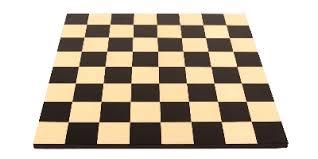Chessboard decimation
You and a friend start with a standard 8x8 chessboard.

You play a game where each player takes turns removing an n × n square, 1 ≤ n ≤ 8 . The person to remove the last square loses the game. Which player has a winning strategy?
This section requires Javascript.
You are seeing this because something didn't load right. We suggest you, (a) try
refreshing the page, (b) enabling javascript if it is disabled on your browser and,
finally, (c)
loading the
non-javascript version of this page
. We're sorry about the hassle.
1 solution
This works on any sized board because the number of remaining squares is always odd, right?
Yup! Rectangular shaped boards would be interesting though.
Log in to reply
For boards of size 1 × n , the answer is obvious, A wins for even n and B for odd n .
If the board is n × ( n − 1 ) , then A can remove an ( n − 1 ) × ( n − 1 ) square, leaving the above situation for B . As we saw, for odd length, the second player – which is now A – wins. So, for even n , A wins on the n × ( n − 1 ) board, but for odd n , we can't say anything because A wouldn't start as I said.
Log in to reply
Again, for an n × ( n − 1 ) board, A could also take an ( n − 2 ) × ( n − 2 ) square that only touches one side of the board. Then, there would be 2 ( n − 1 ) + ( n − 2 ) = 3 n − 4 squares left in a long line (not straight, but one line). For odd 3 n − 4 , this strategie would guarantee a win for A , and 3 n − 4 is odd iff n is odd. So A also wins the n × ( n − 1 ) board for odd n , therefore A wins on every n × ( n − 1 ) board.
Also, B wins on a 4 × 2 board (found by testing every possible first move and B 's responses).
This then means, that A wins the 4 × 6 board by taking away an 4 × 4 square, leaving the above situation.
Log in to reply
And in general, if (and only if) B wins on the m × n board ( m > n ), then A wins on the m × ( m + n ) board.
This is my table of winning positions so far.
1 2 3 4 5 6 7 8 9 1 0 ⋮ 1 B A B A B A B A B A 2 A A A B B A A 3 B A A A 4 A B A A A A 5 B B A A A A 6 A A A A A A 7 B A A A A A 8 A A A A 9 B A A A 1 0 A A A ⋯ ⋱
Log in to reply
Ah yes, I agree with this diagram plus I think 5x2 is a win for B as well... Other than that I'm guessing there aren't too many more wins for B other than 1xn for odd n (and maybe 9x2?) but I'll need to take a closer look...
Log in to reply
@Geoff Pilling – Thanks for testing this! It makes 5 × 7 and 2 × 7 also winning positions for A , because A can force a 2 × 5 -position by placing the first square and then getting this situation where A wins.
If m+n is even, and you can remove m-1*n-1 squares, this strategy still works. If m+n is odd, it doesn't.
Log in to reply
Ah, but what about if you can only remove squares from a board that is originally rectangular?
I thought the same thing! 😃
The first player simply removes a 7x7 square, guaranteeing a win.
I wonder though if this can be generalized for rectangular m x n boards... 🤔